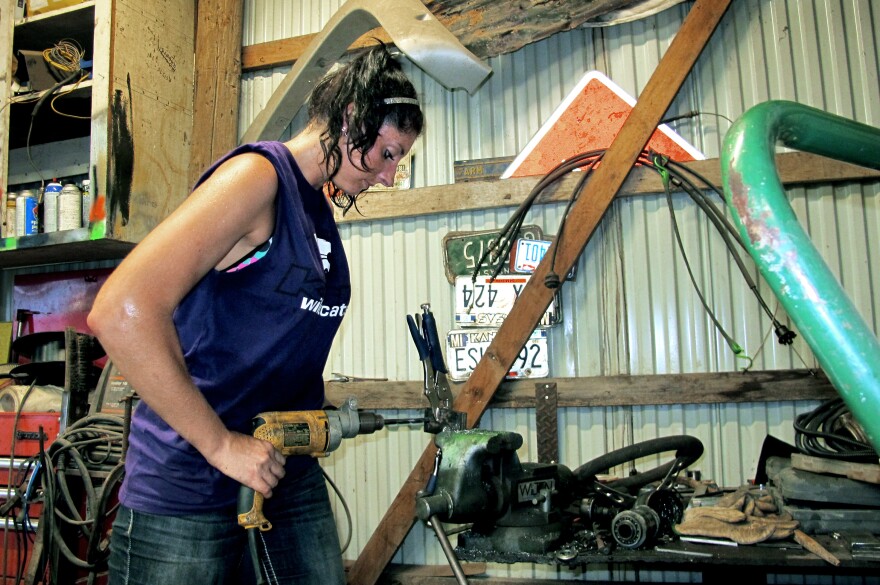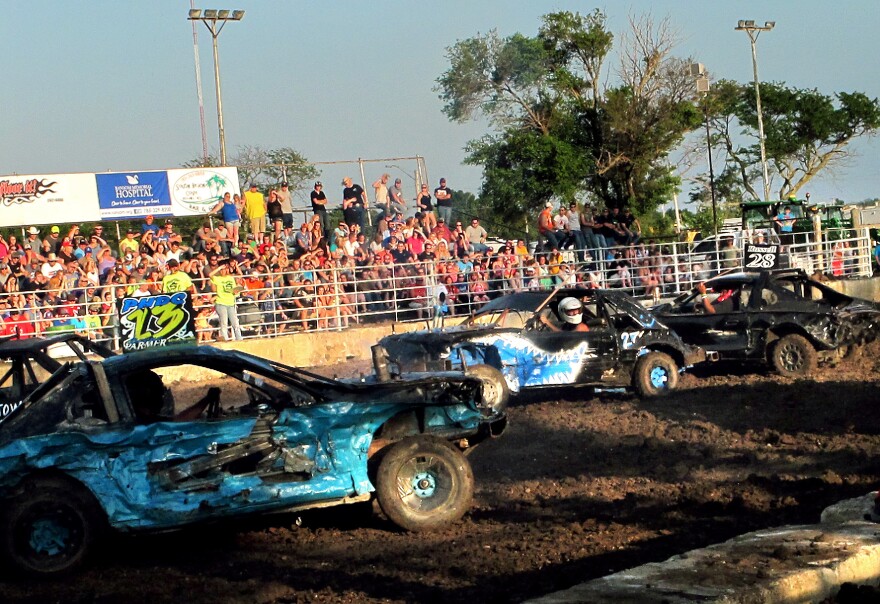Americans have been intentionally ramming cars into each other for sport for decades. And at this time of year, fans crowd into county fairs to see battered, souped-up cars bash each other to pieces.
This steel equivalent of blood sport draws a passionate following, and the drivers say it is deeply addicting.
"There's nothing better," says John Green, a demolition derby driver at a recent fair in Franklin County, Kan. "A lot of people say they would do it, but until you get in there and do it you never know the real feeling."
Exhilarating as it all is, only a handful of cars face Green in the arena — about one tenth as many as decades ago. Demolition derby has changed — and some fear it may be running out of gas.
"Another year, then it's over — at least for around here. There's not enough people to keep it going," he says.
They're not making cars like they used to either. There's a lot of plastic on cars, aluminum on cars, and they'll just shrivel up like a pop can.
The problem is widespread. In Rock Springs, Wyo., George Pryich, had been running demolition derby for 36 years. This summer, he had to call it quits.
"The last three or four years, it was basically on life support. We just couldn't get any drivers interested in running a derby," Pryich says.
To understand what's destroying smaller demo derbies and why people care, you have to go back to a hot evening, two days before the fair in Franklin County.
Sparks are flying, curses too, in this backyard in Wellsville, Kan., where a group of friends toil over the hulk of a steel-laden monster.
"This car doesn't have a drive shaft, brakes, motor, tranny, radiator, needs bumper shocks, leaf spring clamps. It'll run Saturday," says Brent Parmer.
Parmer, an old hand at demo derby, says there's an arms race of sorts underway. Drivers are fortifying their cars with mounds of steel, even up to $20,000 worth of high-end parts. So, money is becoming a barrier. Time is another one. Building a state-of-the-art derby car can take months and often requires help from skilled, resourceful friends like Shelby Miller.
"It's having fun with family and friends," Miller says. "It's a hobby. This is what we do, this is our lives."

Like most people in demo derby, Miller's got a family history. Her mom and dad derbied. So did her brother — in fact, his name is Derby.
But this lifestyle's raw material is getting scarce. A huge jump in scrap metal prices has sent thousands of heavy '70s cars to the crusher.
"They're not making cars like they used to either. There's a lot of plastic on cars, aluminum on cars, and they'll just shrivel up like a pop can," Miller says.
Pained at watching their sport crumple, some demo derby promoters are trying a major reboot. It's called hobo class.
"The little guy can do it. It don't cost $20,000 to build a car," says Hugh Griggs, another veteran driver.
Griggs says lightly modified hobo cars are ready almost as soon as you kick out the glass. These heaps chug around the arena spraying steam and dragging broken parts. Griggs says it's old school, to a point.
"Like the car I'm driving. It's made in the '90s. It's not half as tough as an older car made in the '70s, so I have to drive it, and I can't hit real hard with it," Griggs says.
It may look like the sport is headed for a wall, but these builders and drivers are resourceful. Some will drive in high-end national derbies. Others will just compete with whatever they can find in the junkyard even after all the '70s land yachts have long since been demolished.
Copyright 2015 KCUR 89.3


